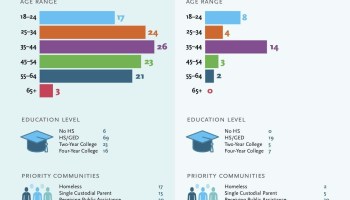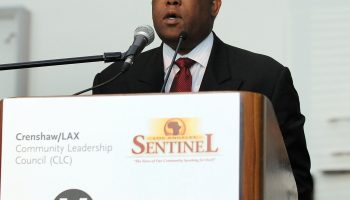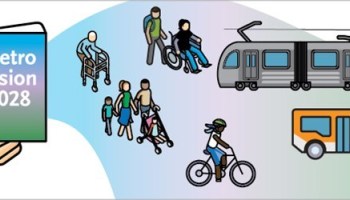Over the last few weeks Metro, like many public agencies, has been reflecting on the role we play in creating an equitable and just Los Angeles area. We can rightfully point to projects and programs that we believe will make our region better.
The very core of our agency’s mission is to provide mobility that can improve everyone’s lives. Especially the people who need us the most, which are often minority communities. That’s the reason you’ll soon see #BlackLivesMatter and #NoMoreNames on headsigns and decals/posters on our buses, trains and stations. We want to show you that we’re listening.
It is impossible to go forward without acknowledging what has come before. Bus service that carries most of our riders — who tend to be Black and Latino — was allowed to erode. Freeways were built through minority communities while more affluent, whiter communities were spared. Community engagement too often favored the NIMBYs and overlooked our core customers. Fare enforcement too often targeted Black and Latino young men.
These aren’t easy truths to swallow. We also think that these truths, however unpleasant, can serve as a foundation for building a better future.
There are a number of efforts at Metro that we believe will accomplish that.
We are trying to speed up bus service and make it much more frequent and build a rail system that truly connects all communities. We’re trying to improve conditions on transit for women, who comprise more than half our riders, and we now have an equity officer to help the agency better reach the communities that need us most. We’re providing minority-owned businesses with the tools they need to successfully bid for more government contracts. And we’re hoping, through our future transportation school in South L.A., to give more people the education they need to work in and shape our industry. This is a short list.
The labor unions that represent the majority of our workforce have also let us know they, too, are committed to advancing social justice and human rights. “Lifting all communities by providing good and meaningful jobs is our core mission,” the unions said in a statement.
It is worth mentioning that Metro’s nearly 11,000 workforce is diverse and more than half our employees are Black, Latino or Asian. Many of our workers, including Metro CEO Phil Washington, come from the communities that most depend on mobility to connect them to opportunity. For these reasons and many others, Metro joins everyone in mourning the lives of George Floyd, Ahmaud Arbery, Breonna Taylor and so many others who needlessly lost their lives to police brutality. And we go forward, determined to honor their lives by doing our job as best we can.
The following is the text of an email that Metro CEO Phil Washington sent to staff recently:
Dear Metro Employee Family,
Our city, our agency, and our country are in the middle of a turbulent and painful time. On the heels of the unprecedented shutdowns and economic devastation caused by COVID-19, we are faced with alarming examples of long-standing racial injustice. The brutal, heartbreaking, and senseless killings of George Floyd, Ahmaud Arbery, Breonna Taylor and so many others perpetrated on the Black community have rightfully sparked outrage among Metro employees and in the heart of every decent American.
I am writing to you today to let you know that I understand the sadness, shock and heartache that Metro employees, millions of Angelenos and people around the country are feeling. I feel it too. I am not just a CEO, I am a Black Man and a father of a Black son. I am also a child of the Civil Rights Movement; whose mother took him to marches in the City of Chicago as a youngster. The hallmark of my tenure at Metro has been ensuring equity both in the services we provide to the community and within our agency. This has been evidenced by my standing up an Office of Race and Equity, advancing the Equity Platform and ensuring diversity on my senior leadership team.
My steadfast commitment to the principles of equity and equality does not stem from any official vote or action by a governing body, it comes from my own personal lived experience.
When I was about 15-16 years old, my mother, sisters and I were on our way home from church on a Sunday evening. It was about 9:30 p.m. and my single mother, who worked 12-14 hours per day, decided to treat all six of us to one hamburger apiece at White Castle. That’s all she could afford, but she was so excited to do it that night. I think she sent me into White Castle, or perhaps as the only son of six, I was tabbed to go in with her. We went into the White Castle restaurant at 111th and State on the Southside of Chicago and purchased the burgers and got back into the car. We continued further South, to the public housing complex, where we lived. We pulled into the parking lot at our modest row apartments and got out of the car. Suddenly, a police squad car pulled up and two white cops jumped out and begin to call me by another name. “Hobson, Hobson!”
My mother was there, along with my sisters. I wasn’t sure what to do. We were all out of the car and these officers had their guns drawn and were out of their car and calling me by the wrong name. They were, as we say, “locked and cocked.” I was frozen looking at these cops and thought that they would kill me. My dear mother came around from the driver’s side and got in between me and those police officers and said to them, his name is Phillip Washington, not Hobson. I thought the officers might shoot my mother, then me. My mother may have saved my life that night.
What was the backstory? I found out a week or so later, that a guy I knew, Donald Hobson, who was from the same neighborhood, had robbed a store. “Hobbs” was a few years older than I and was a serious dude. He had robbed a store earlier that evening and the cops were looking for him and they thought I was him. I really believe they would have killed me that night without even asking me my name. This is the perspective that I come with as it relates to the recent George Floyd killing. And I’m sure many other Black men have had similar experiences and have this type perspective of the police.
It is because of my lived experience with racism that I take the Floyd, Taylor, Garner, Castile (Philando was my own third cousin in Minnesota) and other unjustified police killings so personally. These senseless killings were attacks not just on the Black community, but on our entire human community. I deeply empathize with all victims of abusive power and excessive force. We send our love and support to the families of the victims who are mourning these senseless deaths and tragic loss of life.
As hard as it may be, especially in the face of the widespread civil unrest we all witnessed over the weekend, we must remember how important Metro is to this community. Of course we provide an essential service, but in my mind this agency is so much more. I believe Metro is a shining example of what our society can and should be: a loving, caring, highly-diverse group of people who are considerate, compassionate, committed, kind, and above all accepting and respectful of all people and their differences.
As we continue to interact with the public, as well as our own family and friends, I encourage all of you to take this time to reflect on the ideals of empathy, compassion, and understanding. Let’s look for ways to foster these values in our community and in our own lives.
Sincerely,
Phillip A. Washington
Chief Executive Officer
Categories: Feedback, Policy & Funding, Projects




Thank you Mr. Washington and much love and appreciation for all of the Metro team that gets this city running each day, every day of the year, all 365 days and then some.
Not only Fare Enforcements who was discriminating us, so does the Bus Inspector. I was involved with the Black Lady for thinking I was recording in the bus. In reality, I was checking to see if my camera works fine because I accidentally drop my camera to the ground and she was threatening me to call the law enforcement agencies to arrest me. I don’t use Commercial Purposes, I use Commercial Purposes Only.
Thank you to all the Metro staff, and especially Mr. Washington for sharing such a harrowing personal account. I am just one rider who supports this most critical of services in our city but one of many more, and I will share this statement with my friends and family for days to come.
Then maybe back it up with actions?
Metro chose to cut bus routes more than trains during COVID-19 despite busses maintaining a higher percentage of ridership than trains. And guess who rides busses more? BLACK AND BROWN FOLKS.
Y’all racist.
Not sure what you’re talking about, but at the very lease at the beginning of the pandemic, those buses were running empty!!!! Like either literally one empty bus or anywhere between 5-15 people (on a bus designed to carry 84 people).
I’m not saying Metro is a victim here, it definitely screwed over its core ridership suddenly suspending services, but you can’t expect any transit agency, public or private, to simply run empty buses every 5-10 min all day either.
You’re deflecting, so I’m going to put it simply:
Should Metro have cut transit overall because COVID caused a huge drop in transit? Sure, makes fiscal sense.
Should Metro have cut busses more than trains, despite busses retaining a higher percentage or ridership during COVID? HELL NAW.
Metro’s own data shows that busses were carrying more people and retained more ridership, so why cut it?
Metro’s own data shows that black and brown people overwhelmingly use busses, whereas white and Asian people prefer trains.
There’s a very clear path that Metro is following.
Not acknowledging it is not acknowledging entrenched racism at Metro.
– Is there a conversation within Metro about their relationship with LAPD? Yesterday I saw an ad for police recruitment on the side of a bus.
– Can we see a plan for more reliable service and a plan to keep buses running especially in moments of crisis?
– What should we make of so many major projects aimed to serve communities of color getting increasingly delayed in their construction every year?
I’m aware of the work Metro is doing towards transit equity but this is a moment for changing policies and creating new plans.
To Metro and Mr. Washington,
I really do believe you when you say that you recognize the trauma of this moment and reflect the desire of so many of us to make our city more equitable for black and brown Angelenos.
That said, I also want to reiterate what others have noted about Metro’s actions taken during the protests in response to George Floyd’s murder. Stopping bus and rail service during the curfews without advance warning was harmful to essential workers who were stranded. Aiding the LAPD by allowing peaceful protesters to be loaded onto Metro buses was a disgraceful use of our public transit infrastructure. I wish this statement had included an apology on that front.
As a backdrop to this, our neighbors experiencing homelessness, a third of whom are black according to the latest LAHSA counts, are over-policed in metro stations and on trains. Please consider amnesty for fare violations, the installation of public utilities such as more restrooms and shade at metro stops, and a reduction in armed police enforcement in our transit system.